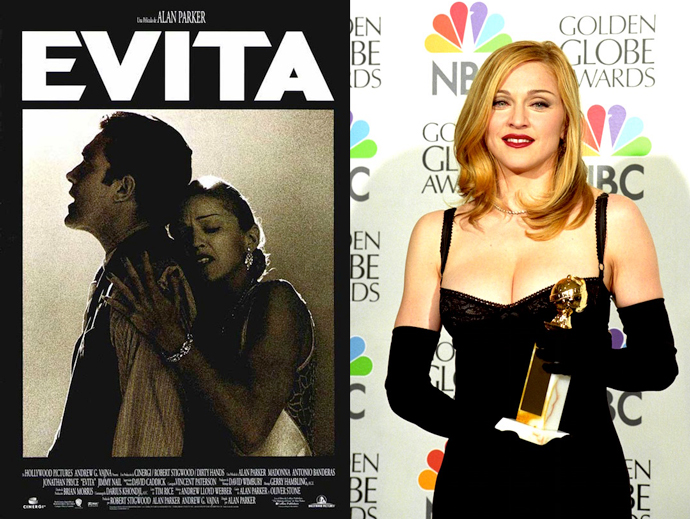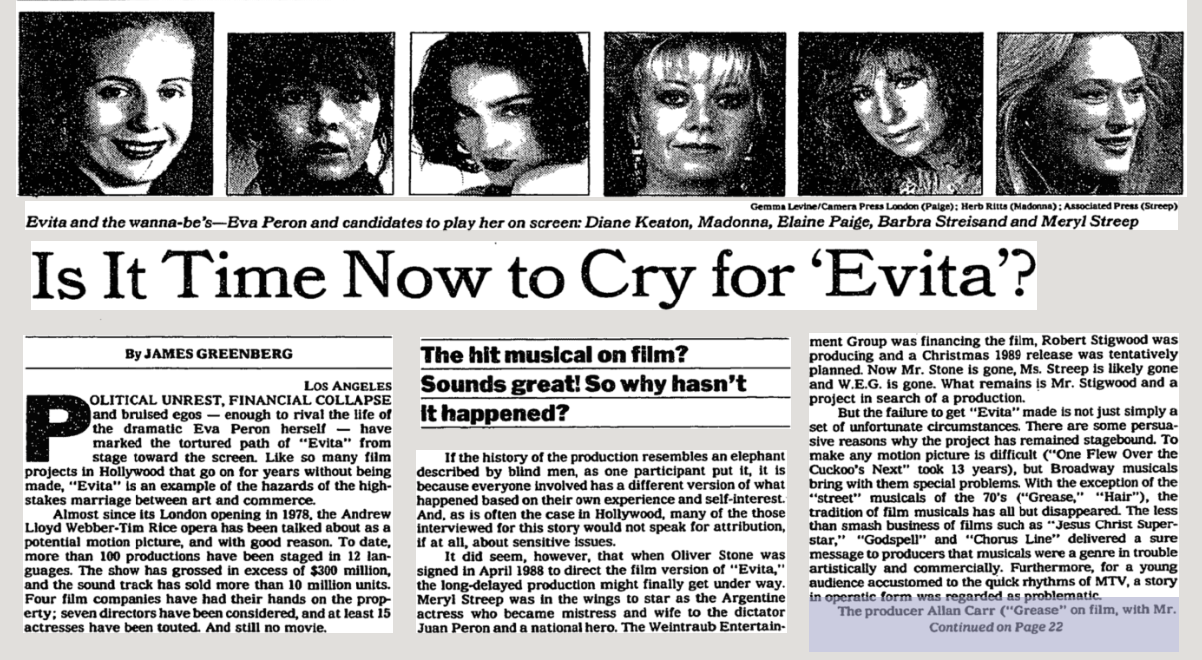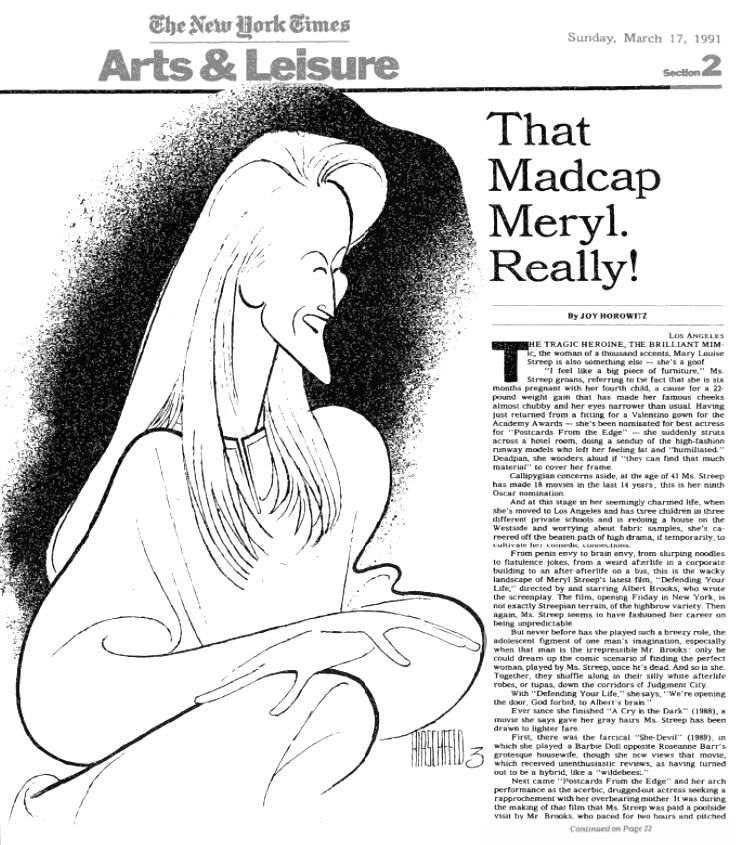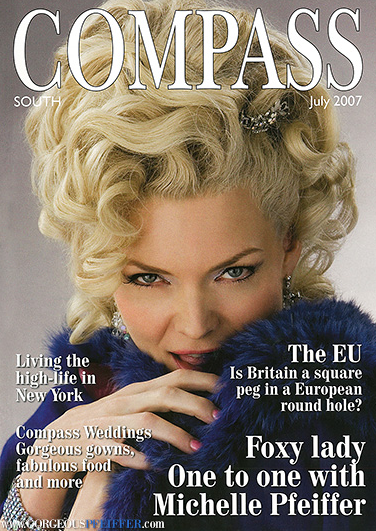by Gabriel Mayora

On Christmas day, twenty-five years ago, Evita (1996) premiered nationwide in theaters. The musical adaptation was helmed by Alan Parker and international superstar Madonna was its leading lady. For her divisive star turn, the actress was famously awarded a Golden Globe for Best Actress in a Musical or Comedy over Frances McDormand (Fargo), who went on to claim the Academy Award in the equivalent category a couple of months later. Yet, Madonna’s name was left out of the Academy’s Best Actress line-up, suggesting the casting and Madonna's pop stardom may have proven too controversial for the group.
Much like Effie White, Fantine, and Velma Kelly, Eva Perón is the kind of role that appears destined to win awards sight unseen. What happened, then?
Perhaps another actress who was originally cast in the role and whose career is indelibly tied to the Academy Awards would have garnered that nomination? What if that actress’s much-publicized casting in Evita and eventual departure made it tough for Academy voters to accept Madonna as a legitimate choice?
The circumstances surrounding Meryl Streep’s involvement with Evita remain fascinating all these years later, especially given the contradictory media reports and Streep’s conflicting statements over the years. There are a few facts that remain consistent across all reports from the time. In March of 1989, The Washington Post announced that Streep was set to star in the film, with Oliver Stone at the helm, after a “decade-long search” the paper compared to the legendary casting process behind Gone with the Wind’s Scarlett O’Hara. By all accounts, Streep’s recording of the songs marveled everyone involved with the production and, after being cast, she spent a year preparing for the role.
 a 1989 article from the New York Times
a 1989 article from the New York Times
What happened after is a bit more unclear. By September of 1989, it was announced that Streep had dropped out of the film due to exhaustion. An extensive report from The New York Times published the following month provided alternative theories regarding her departure—a breakdown in salary negotiations, concerns over tensions between Stone and the producing team, frustrations with the postponed production timetable. The same report alleges that Streep eventually changed her decision and chose to make the film, but Stone had abandoned the project at that point.
There is some evidence that suggests Streep remained interested in starring in Evita past 1989. Notably, a 1991 New York Times profile tied to the release of Defending Your Life characterizes Streep as “a shrewd careerist” based on the response she gives regarding the casting of Madonna in the role.

It is in this profile where she is infamously quoted as saying, “I could rip her throat out. I can sing better than she can, if that counts for anything.” Years later, Streep would deny saying this, dismissing the quote as Internet lore.
The transition from Meryl Streep to Madonna was far from seamless.
 In 1994, upon his return to the project, Oliver Stone—whose meeting with Madonna when he was first involved with the project led him to decide they would not work well together—chose to cast Michelle Pfeiffer. According to a 2007 profile in the British publication Compass, Pfeiffer recorded demos of the score and started preparing for the part while Stone was involved. Then, the director quit the project for good (he is credited as a co-writer and executive producer in the film). When Alan Parker came on board, Pfeiffer was still the top choice. By this time, the actress had a newborn and the shooting location had moved from L.A. to England, which would have meant spending several months away from her family. Pfeiffer, then, became the second leading lady to depart the project, clearing the path for Alan Parker to eventually offer the role to Madonna. At least fans got a tease of what Michelle Pfeiffer’s Evita would have been like when the demos she recorded for Stone became widely circulated among theater fans online.
In 1994, upon his return to the project, Oliver Stone—whose meeting with Madonna when he was first involved with the project led him to decide they would not work well together—chose to cast Michelle Pfeiffer. According to a 2007 profile in the British publication Compass, Pfeiffer recorded demos of the score and started preparing for the part while Stone was involved. Then, the director quit the project for good (he is credited as a co-writer and executive producer in the film). When Alan Parker came on board, Pfeiffer was still the top choice. By this time, the actress had a newborn and the shooting location had moved from L.A. to England, which would have meant spending several months away from her family. Pfeiffer, then, became the second leading lady to depart the project, clearing the path for Alan Parker to eventually offer the role to Madonna. At least fans got a tease of what Michelle Pfeiffer’s Evita would have been like when the demos she recorded for Stone became widely circulated among theater fans online.
Ultimately, we will never know what Streep or Pfeiffer would have done with the part. Madonna’s acting career never again reached the heights of her performance in Evita. It would take both Pfeiffer and Streep another decade before they'd star in movie musical based on a Broadway show. They both opted for silly over Evita-serious with Hairspray and Mamma Mia!, respectively.
When was the last time you thought of Evita?